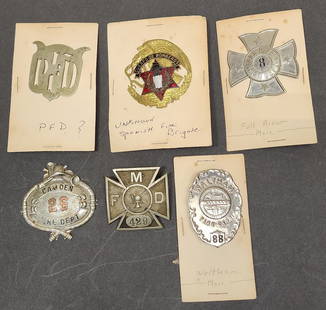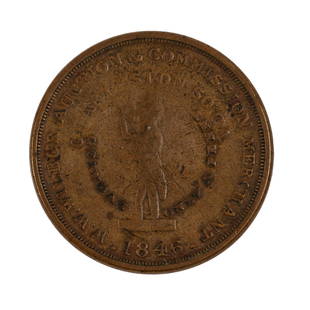
Treasury Department Battles Smuggling to Avoid Customs Duties
Similar Sale History
View More Items in Historical MemorabiliaRelated Historical Memorabilia
More Items in Historical Memorabilia
View MoreRecommended Collectibles
View More


Item Details
Description
Treasury Department Battles Smuggling to Avoid Customs Duties
This circular letter from Commissioner of Customs Nathan Sargent seeks information on the expenses of each district in detecting and preventing fraud and smuggling. In 1867, some British merchants engaged in extensive smuggling into the United States, especially through Canada, to avoid paying customs duties. In his annual report for the year 1867, submitted on November 30, 1867, Secretary of the Treasury Hugh McCulloch declared, "Efforts for the prevention and detection of smuggling have been actively continued during the year, with considerable success, at a comparatively moderate expense, and without any charge upon the public treasury, the proceeds of fines, penalties and forfeitures having proved sufficient to sustain the charge and pay into the treasury a surplus of more than $300,000." The recipient of this copy was James Brady Jr., the collector of the port of Fall River, Massachusetts.
[TREASURY DEPARTMENT.] Nathan Sargent, Circular Letter, Printed Letter Signed in Type, September 19, 1867. 1 p., 8ʺ x 8ʺ. Includes handwritten note in margin, "Recd Sept 30th, 1867." Pinholes in left margin for binding; very good.
Excerpt
"You will please render to this Office, at your earliest convenience, a report for the year ending June 30, 1867, of the entire expense incurred in your District in preventing and detecting smuggling. This report will embrace the pay and expenses of all your Inspectors and other employees whose services could have been dispensed with, had it not been for the protection of the Customs Revenue against frauds."
Historical Background
In his report that formed a part of the Secretary of the Treasury's report, Commissioner of Customs Nathan Sargent explained the challenges of suppressing this illicit trade:
"Smuggling, the prevention of which is assigned to this office, has been less successful during the past year than it has been heretofore, since our high tariff of duties upon foreign importations so strongly tempted the cupidity of the smuggler. It has only been repressed, however, by constant, unremitted vigilance on the part of customs officers and the special agents who have been necessarily employed to watch and counteract the smuggler, detect his operations, seize him and his smuggled goods, and prosecute the cases in court. The moment this vigilance is relaxed, or the sentinels set to watch the operations of contrabandists withdrawn, that moment would be seen, or felt, the same activity among those who prefer unlawful to lawful employment and gains, as existed before they were so closely watched, and so relentlessly pursued, arrested, and prosecuted. They are only intimidated, not annihilated; their name is legion, and they swarm along the whole frontier.
"Special agents and detectives, acting under my instructions, have, during the past year, been very successful in ferreting out and bringing to light cases of smuggling which had been successfully accomplished one, two, and, in some instances, three years before—among these some large operations—in all of which the evil doers have been compelled to disgorge not only their ill-gotten gains, but in some cases large sums besides. Detection, in these instances, has come upon them with chilling surprise. They had flattered themselves that time had obliterated their tracks, and that their large profits were secure in their vaults, or as investments in other operations; but to be suddenly and unexpectedly confronted by an officer of the law, in their fancied security, and compelled either to ‘own up,' and compromise as best they could, or be bound over to court, was such ‘a change of the spirit of their dreams' as they had not calculated on. Those who have thus been overtaken are not likely to re-engage in similar illegal transactions. Many a wholesome lesson of this kind has been inflicted during the past year, to the great benefit of the public treasury. But smuggling has not ceased; it has sought other and more devious roads than those heretofore travelled, and is carried on in a more systematic way by those who undertake it on a larger scale, and with corresponding capital. I have reason to believe that extensive combinations have been formed by men in this country and in Europe, who have large means at command, to run foreign goods into this country without the payment of duties. Indeed, those combinations have existed for some time past, and they have probably been, to a considerable extent, successful in their operations."
"It has been found ineffectual to rely upon the ordinary officers of customs for the prevention of smuggling—to ferret out, pursue, arrest, and bring to justice these violators of the laws, to procure the necessary testimony to convict them—in short, to enforce the law and its penalties upon them, to do which often requires months of labor, hundreds of miles of travel, and a considerable expenditure of money. This cannot be done by ordinary customs officers, whose duties require them to be daily on duty at the same place. Even collectors are unable to give the time and attention necessary to perform this peculiar work—a work requiring special aptitudes for its successful accomplishment which few collectors, and few men, possess. I have, therefore, been compelled, by necessity, to ask for the appointment of and to employ special agents, assistant agents, and inspectors, whose labors have been arduous, incessant, and highly successful."
Nathan Sargent (1794-1875) was born in Vermont and studied law while teaching school. After gaining admission to the bar in 1818, Sargent moved to Cahawba, Alabama, where he served as judge of the county and probate courts in the early 1820s. Because of ill health, he moved to Buffalo, New York, in 1826 and continued the practice of law. In 1830, he established the Commercial Herald, a Whig newspaper in Philadelphia. In the 1840s, he moved to Washington, D.C., where he wrote letters to various newspapers of the proceedings in Congress and the capital city. In 1844, he wrote a brief campaign biography of Henry Clay. Sargent served as the sergeant-at-arms of the U.S. House of Representatives (1847-1851) and the register of the General Land Office (1851-1853). President Abraham Lincoln appointed Sargent as Commissioner of Customs in May 1861, and he held the position until 1871.
James Brady Jr. (1830-1909) was born in Massachusetts and worked at a cotton factory. From 1848 to 1850, he supervised the spinning department at a cotton mill in Utica, New York, before returning to Massachusetts, where he continued to work in a cotton mill. During the Civil War, he volunteered as a first lieutenant in the 26th Massachusetts Infantry Regiment and served primarily in Louisiana and Virginia. He became the captain of his company in December 1862. He moved to the veteran roll in January 1864. He served as collector of customs at Fall River, Massachusetts, from 1865 to 1895 and again from 1900 until his death.
This item comes with a Certificate from John Reznikoff, a premier authenticator for both major 3rd party authentication services, PSA and JSA (James Spence Authentications), as well as numerous auction houses.
WE PROVIDE IN-HOUSE SHIPPING WORLDWIDE.
Buyer's Premium
- 25%
Treasury Department Battles Smuggling to Avoid Customs Duties
Shipping & Pickup Options
Item located in Wilton, CT, usPayment

Auction Curated By

























![[Americana] [Shays's Rebellion] Partially-printed Commonwealth of Massachusetts Treasury Loan: [Americana] [Shays's Rebellion] Partially-printed Commonwealth of Massachusetts Treasury Loan Certificate A very rare loan certificate issued to pay for the suppression of Shays's Rebellion](https://p1.liveauctioneers.com/65/259470/135047469_1_x.jpg?height=310&quality=70&version=1661539042)








![[Counter-Culture], City of Chicago Police Department: [Counter-Culture] City of Chicago Police Department Field Reporting Manual Chicago, Illinois, ca. 1965-1969. Blue binder stamped with Chicago Police logo, containing a manual with original mugshots, D](https://p1.liveauctioneers.com/65/192593/97105404_1_x.jpg?height=310&quality=70&version=1611610147)


![Hannibal Hamlin on His Calling Card Seeks Post at New York Customs House for Maine Native: Hannibal Hamlin[Washington, D.C.], ca. 1870Hannibal Hamlin on His Calling Card Seeks Post at New York Customs House for Maine NativeANSHANNIBAL HAMLIN, Autograph Note Signed, to "Mr. Terwilliger," on](https://p1.liveauctioneers.com/6306/327579/176471835_1_x.jpg?height=310&quality=70&version=1714074043)
![William McKinley Bold TLS on Ohio "Executive Department" Stationery Less Than 1 Week After His: William McKinley[Columbus, Ohio], November 13, 1893William McKinley Bold TLS on Ohio "Executive Department" Stationery Less Than 1 Week After His ReelectionTLSA 1p typed letter signed by fut](https://p1.liveauctioneers.com/6306/327579/176471617_1_x.jpg?height=310&quality=70&version=1714074043)

















![10 Days After His Assassination JFK Signed W. H. letter, Fantastic! Among JFK's Last Acts in White H: John F. Kennedy[Washington, D.C.], December 2, 196310 Days After His Assassination JFK Signed W. H. letter, Fantastic! Among JFK's Last Acts in White House Post Dated Before Dallas TripTLSJOHN F. KENN](https://p1.liveauctioneers.com/6306/327579/176471594_1_x.jpg?height=310&quality=70&version=1714074043)





![S. Sewall Court Document Involving Three Participants in Salem Witch Trials: Salem Witch TrialsSalem, MA, 17th centuryS. Sewall Court Document Involving Three Participants in Salem Witch TrialsADS[WITCHCRAFT.] Stephen Sewall, Autograph Document Signed, Writ of Attachment in Ma](https://p1.liveauctioneers.com/6306/327579/176471806_1_x.jpg?height=310&quality=70&version=1714074043)



![[CIRCUS]. Four American circus posters. Includes three Ring...: [CIRCUS]. Four American circus posters. Includes three Ringling Bros. and Barnum & Bailey posters; and Clyde Beatty-Cole Bros./Capt. Astronaut. All half-sheet (approx. 28 x 21”), unbacked, with](https://p1.liveauctioneers.com/928/325952/175495737_1_x.jpg?height=310&quality=70&version=1712935174)











![George Washington Signed Discharge: Partly printed discharge document signed by George Washington, as Commander in Chief of the Armies of the United States. Newburgh, [New York], 4 January 1783. 1 page, ## x ## in. Undersigned by Washin](https://p1.liveauctioneers.com/7226/322253/173251475_1_x.jpg?height=310&quality=70&version=1710004847)
![[Ambrotype] Texas Confederate Soldier: Sixth plate ambrotype. Full leatherette case. Portrait of a possible Texas Confederate soldier. A silver star device was used to pin up the brim of his light-toned headgear, a look often seen in image](https://p1.liveauctioneers.com/7226/322253/173251509_1_x.jpg?height=310&quality=70&version=1710004847)


![Captured Bowie Knife w/ Period Note of Provenance: Captured Confederate D-hilt Bowie knife. [Kenansville, North Carolina]: [Louis Froelich factory]. With original metal and leather sheath with affixed period notes. First note with only remnants. Secon](https://p1.liveauctioneers.com/7226/325455/175169154_1_x.jpg?height=310&quality=70&version=1712370394)
